We Foster A Collaborative Big Data Workforce.
Komen’s Big Data Travel Scholarships allow participation of breast cancer researchers/oncologists in scientific workshops and conferences that provide specific training and curriculum related to big data, specifically the use of data, tools and methods in data science that can be incorporated in breast cancer research. Here are the scholarships that Komen has awarded to date.
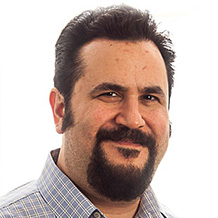
Jason Herschkowitz, Ph.D.
Assistant Professor at the University of Albany, Dr. Herschkowitz is investigating how early-stage breast cancers, called ductal carcinoma in situ (DCIS), develop into metastatic breast cancers. Most women with DCIS are treated with lumpectomy and radiation therapy or mastectomy which, while effective, may be unnecessary for some women diagnosed with DCIS who may not develop metastatic cancer. The goal of...
Read more
Assistant Professor at the University of Albany, Dr. Herschkowitz is investigating how early-stage breast cancers, called ductal carcinoma in situ (DCIS), develop into metastatic breast cancers. Most women with DCIS are treated with lumpectomy and radiation therapy or mastectomy which, while effective, may be unnecessary for some women diagnosed with DCIS who may not develop metastatic cancer. The goal of this study is to better predict which DCIS patients will (or will not) develop metastasis so that treatments can be better tailored for the individual patient, avoiding unnecessary treatments and side-effects. Dr. Herschkowitz also hopes to identify new treatment targets to stop DCIS from metastasizing altogether. He used Komen’s Big Data Travel Scholarship to attend the Epigenetics and Human Disease, Keystone Symposium in Banff, Alberta, Canada.
View less
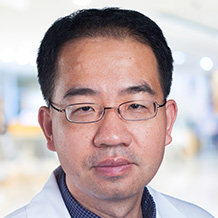
Zhijie (Jason) Liu, Ph.D.
Assistant Professor at the University of Texas Health Science Center at San Antonio, Dr. Liu’s research focuses on combining molecular biology, cell biology and genetics, and a variety of genomics approaches to study breast cancers, particularly those resistant to hormone therapy. Specifically, he tries to understand the mechanism by which breast cancers develop hormone resistance through the activation of a...
Read more
Assistant Professor at the University of Texas Health Science Center at San Antonio, Dr. Liu’s research focuses on combining molecular biology, cell biology and genetics, and a variety of genomics approaches to study breast cancers, particularly those resistant to hormone therapy. Specifically, he tries to understand the mechanism by which breast cancers develop hormone resistance through the activation of a protein called ERα enhancer. Dr. Liu aims to leverage that knowledge to identify biomarkers of hormone resistance and new therapeutic targets to counter it. He used Komen’s Big Data Travel Scholarship to attend the Gordon Research Conference “Genome Architecture in Cell Fate and Disease” in Hong Kong, China.
View less
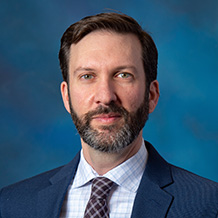
Adam Soloff, Ph.D.
Assistant Professor at the University of Pittsburgh, Dr. Soloff’s research examines how to use the body’s own immune system against breast cancer. Focusing on vaccination, his studies explore how to hack viruses to deliver important inflammatory proteins to augment immune response against breast cancer tumor. More than considering vaccination as a method to prevent breast cancer, Dr. Soloff’s work also...
Read more
Assistant Professor at the University of Pittsburgh, Dr. Soloff’s research examines how to use the body’s own immune system against breast cancer. Focusing on vaccination, his studies explore how to hack viruses to deliver important inflammatory proteins to augment immune response against breast cancer tumor. More than considering vaccination as a method to prevent breast cancer, Dr. Soloff’s work also applies his approaches to treating already established breast cancer. His goal is also to translate these findings into clinical treatment of patients with metastatic breast cancer. He used Komen’s Big Data Travel Scholarship to attend the American Association of Immunologists Annual Meeting in San Diego, CA.
View less
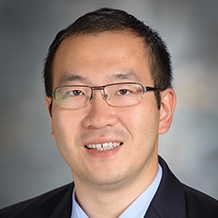
Xin Lu, Ph.D.
Assistant Professor at the University of Notre Dame, Dr. Lu is studying how neutrophils, the most abundant immune cell in the body, support metastatic breast cancer. Preliminary studies indicate that neutrophils can ingest material released from tumor cells, turning them into ‘bad’ neutrophils that help cancer spread. The goal of this research is to detect these ‘bad’ neutrophils and use...
Read more
Assistant Professor at the University of Notre Dame, Dr. Lu is studying how neutrophils, the most abundant immune cell in the body, support metastatic breast cancer. Preliminary studies indicate that neutrophils can ingest material released from tumor cells, turning them into ‘bad’ neutrophils that help cancer spread. The goal of this research is to detect these ‘bad’ neutrophils and use them as a predictor of metastasis, and to find a way to target these ‘bad’ neutrophils so that metastasis can be stopped. He used Komen’s Big Data Travel Scholarship to attend the Cold Spring Harbor Lab “High-Throughout Biology: From Sequence to Networks” in Cold Spring Harbor, NY.
View less
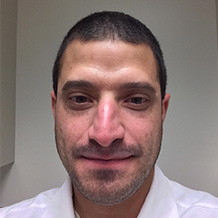
Omar Rahal, Ph.D.
Postdoctoral fellow at the University of Texas M.D. Anderson Cancer Center, Dr. Rahal is studying why inflammatory breast cancer (IBC) has a high rate of recurrence following radiation therapy. IBC is a rare but aggressive type of breast cancer that often results in metastatic disease, and has few treatment options. IBC is treated with a combination of surgery, chemotherapy, and...
Read more
Postdoctoral fellow at the University of Texas M.D. Anderson Cancer Center, Dr. Rahal is studying why inflammatory breast cancer (IBC) has a high rate of recurrence following radiation therapy. IBC is a rare but aggressive type of breast cancer that often results in metastatic disease, and has few treatment options. IBC is treated with a combination of surgery, chemotherapy, and radiation therapy. However, treatment resistance is common. Dr. Rahal is focused on understanding how the tumor environment of IBC affects treatment resistance to radiation therapy. This information of this study could be used to identify new and more improved treatments for IBC. He used Komen’s Big Data Travel Scholarship to attend the RECOMB/ISCB Conference on Regulatory & Systems Genomics with Dream Challenges organized by the International Society for Computational Biology (ISCB) in New York City.
View less
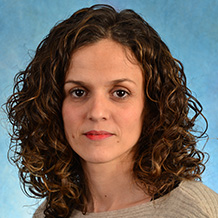
Susana Garcia Recio, Ph.D.
Postdoctoral fellow at the University of North Carolina at Chapel Hill- Lineberger Comprehensive Cancer Center, Chapel Hill, NC, Dr. Garcia’s research career has been focused on understanding the mechanisms by which breast cancer cells proliferate and survive. With a focus on human epidermal growth factor receptor 2 (HER2)-positive breast cancer, her work has been used to design phase 1 clinical...
Read more
Postdoctoral fellow at the University of North Carolina at Chapel Hill- Lineberger Comprehensive Cancer Center, Chapel Hill, NC, Dr. Garcia’s research career has been focused on understanding the mechanisms by which breast cancer cells proliferate and survive. With a focus on human epidermal growth factor receptor 2 (HER2)-positive breast cancer, her work has been used to design phase 1 clinical trial in patients with advanced and refractory solid tumors to test potential new treatments. Dr. Garcia is currently applying what she learnt with HER2-positive breast cancer to triple negative breast cancer (TNBC), trying to find improved treatments that are specific for each tumor subtype and for each patient. She used Komen’s Big Data Travel Scholarship to attend the Analysis of single cell RNA-seq data in Berlin, Germany.
View less
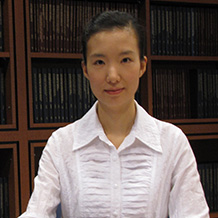
Jia Shen, Ph.D.
Postdoctoral fellow at the University of California, San Diego, Dr. Shen is studying estrogen receptor positive (ER+) breast cancer, which accounts for about 70% of all breast cancers. While treatment with endocrine therapies is very effective for this breast cancer type, many patients develop treatment resistance. Dr. Shen is studying the complex ways that estrogen can control the genes of...
Read more
Postdoctoral fellow at the University of California, San Diego, Dr. Shen is studying estrogen receptor positive (ER+) breast cancer, which accounts for about 70% of all breast cancers. While treatment with endocrine therapies is very effective for this breast cancer type, many patients develop treatment resistance. Dr. Shen is studying the complex ways that estrogen can control the genes of breast cancer cells. The goal of this work is to identify biomarkers that have enhanced ability to predict treatment response to endocrine therapies and to identify new treatment targets for ER+ breast cancer that has become resistance to endocrine therapies. She used Komen’s Big Data Travel Scholarship to attend the Single Cell Biology Keystone Symposium in Breckenridge, CO.
View less